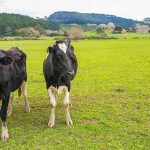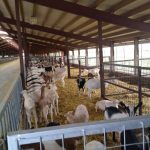
The multinational dairy cooperative has set a goal to hit 30% “intensity reduction” in farm-related emissions by 2030.
New Zealand dairy cooperative Fonterra has unveiled a new on-farm emissions target today (9 November), alongside a new climate roadmap and voluntary climate-related disclosure report.
By 2030, the business, the world’s largest dairy exporter, aims to achieve a 30% “intensity reduction” in its farm-related emissions from a 2018 baseline.
Some 86% of its emissions are said to currently come from its member farms.
The new target will look to cut emissions intensity by tonne of fat and protein corrected milk (FPCM) collected by Fonterra.
Announcing the news at the company’s annual meeting, Miles Hurrell, Fonterra’s CEO, said that while New Zealand farmers are extremely “emissions-efficient” when supplying dairy at scale, improvements still need to be made to ensure farmers don’t “fall behind.”
He added: “As a dairy partner to many of the world’s leading food companies, we’re responding to growing sustainability ambitions from our customers and financial institutions, along with increasing market access, legal and reporting obligations.”
To hit its 30% target, the organisation said it will work towards a 7% reduction through sharing “farming best practices” around feed quality and herd performance.
Fonterra predicts an additional 7% of emissions will also be cut through implementing “novel technologies” via AgriZeroNZ – a joint venture between large agribusiness companies and the government.
The partnership is said to grant farmers better access to the technology they need to reduce agricultural emissions, while still allowing for efficient and productive operations. Besides Fonterra, other shareholders include ANZCO Foods, Rabobank, Ravensdown, Silver Fern Farms and Synlait, who jointly own 50%.
Fonterra is contributing up to NZ$50m ($30m) to the fund over the next four years. Earlier in June, the national government invested NZ$4m into a new methane measurement facility at the Massey University dairy research farm.
Just Food has contacted Fonterra for more information on the specific technologies it plans to use to reach the 7% reduction target.
The company said it plans to cut 8% of emissions by removing carbon from current and new vegetation and an extra 8% from “historical land-use change conversions to dairy.”
Hurrell added that the “collective” move to cut emissions across its farms, operations and in R&D, will “help future proof Fonterra”.
The target announcement follows on from nearly a year of consultations with farmers.
According to Peter McBride, chairman of Fonterra, the on-farm emissions reduction target is expected to impact each farm differently.
In a statement, he said: “There is significant variation within and across farming systems when it comes to emissions intensity. We are confident that we can make solid progress towards our target by working together and sharing information farmer-to-farmer.”
Hitting the climate reduction target is Fonterra’s “biggest opportunity and our biggest challenge,” he added.
“The Co-op’s approach will be to work alongside farmers, not against them, as we collectively make progress towards our target, including investing in methane reduction technologies.”
Alongside the news of its new emissions reduction target, Fonterra also unveiled its climate roadmap towards hitting net zero by 2050.
As part of the strategy, some of Fonterra’s “2025 milestones” include implementing Farm Environment plans in 100% of its New Zealand farms, and ensuring that a zero-deforestation commitment is made across primary deforestation linked commodities by the end that year.
In addition to its 30% intensity reduction target for 2030, Fonterra also plans to achieve 50% “absolute reduction” in its scope 1 and 2 greenhouse gas emissions from a 2018 baseline.
It stressed its strategy for emissions reduction is likely to “evolve alongside the science that supports the changes.”
The company also voluntarily released its first climate-related disclosures report, which details the future opportunities and risks accompanying climate change.
Some risks mentioned include a “decrease in viability of dairy farming” and disruption to the supply chain and business operations, as a result of warming temperatures, deteriorating soil quality, and extreme weather conditions.
In 2021, New Zealand passed a law making climate-related reporting mandatory for more than 200 companies, including Fonterra. The regulation comes into force next year.
Fonterra’s portfolio of dairy-based products includes De Winkel yogurt, Mainland and Perfect Italiano cheeses, Primo flavoured milk and Mammoth protein beverages.
Besides New Zealand, the company’s key markets are China, Australia, Indonesia, and Malaysia.






















